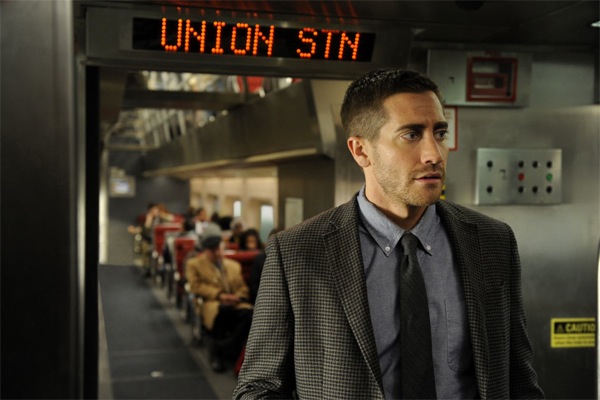Duncan Jones’ debut feature Moon was a triumph of minimalism and raw human emotion wrapped in a sci-fi coating. A powerful piece of cinema it showed an amazing grasp of the medium, and just what could be accomplished on a small budget. His second feature therefore is when we see what the man is made as this time around he gets a bigger budget and a Hollywood leading man in the shape of Jake Gyllenhaal. Can lightning strike twice or will Mr. Jones be remembered as a one hit wonder…?

Captain Colter Stevens awakes to find himself on a train and not in Afghanistan as he believes he should be. To make matters worse he’s not quite himself with the man in the mirror, and the person to everyone thinks he is, being an entirely different man altogether. Things take an even more surreal turn when an explosion rocks the train and he awakes again to find himself trapped in a capsule and being talked to be a voice he doesn’t recognise. Turns out that Captain Stevens is the first subject of a brand new project called Source Code, and what he just witnessed was the last 8 minutes in the life of passenger Sean Fentress on a doomed Chicago commuter train. It is up to Stevens, through the medium of Source Code to relieve these 8 minutes over and over again in an attempt to discern the identity of the person responsible for bombing the train, and thus stop an even bigger disaster from being perpetrated. Even more worryingly nobody seems to want to tell him why exactly he’s there in the first place.
Jake Gyllenhaal finally gets the leading man role his talent has been waiting for since Donnie Darko. It’s more than a curious coincidence that it should share some similarity of tone and subject with his break-out role. Gyllenhaal is at his best when reacting to an unseen threat and his portrayal of Colter Stevens mixes Donnie with his role in Jarhead to create a strong, yet compassionate and real character. This is very much his movie, with the other actors slotted in around him. Michelle Monahan does good work with a structurally limited role, she is destined to repeat the same chain of events so kudos to her for bringing a freshness to each 8 minute segment. Vera Farmiga is brilliant as always, giving a strong but fragile nobility to her military officer. The stand-out though is Jeffrey Wright, who manages to steal every scene he’s in with a morally-ambiguous display that’s a million miles from his normal good-guy roles. The token cameo role is a beautiful nod the films genre and is worth keeping an eye out for.

Knowing too much about the plot of Source Code might hamper one’s enjoyment of the movie. That said I’ve seen it twice and the plot holds up even if you know what’s coming. That’s a credit to the strong direction for director Duncan Jones, who follows up his brilliant debut Moon with another creditable showing here. A few minor plot elements hark to his previous work and manage to bring a wry smile when noticed, and in a small way manage to link the two movies together. Jones has stated in the build-up to this release that he wants that all of his movies happen in the same universe, and that there be some thread, however minor, that joins them. The cinematography is first-rate, with the sharp colours and blue shades of the source code universe giving way to that of the “real world” shades of grey. It creates a very definite visual difference between the two realities and serves as a good tool in reminding the audience of what is real or not. The use of sound in the movie follows a similar path to the visuals, muted more in the capsule and military base than it is on the train. Ben Ripley’s script is given a good work-out, and while the movie does suffer multiple-ending syndrome it can’t take away form the pace and excitement of what went before. By speeding up and slowing down time in the 8-minute source code session Jones neatly avoids the rinse and repeat problem that this genre of film is prone too.
All in all it’s a clever, well directed, sci-fi thriller that isn’t afraid of its sci-fi roots. It won’t appeal to everyone but is a great endorsement of Jones’ skill as a director, and proof positive that Moon wasn’t a fluke. Repeat viewing is almost essential and the movie only grows with each passing moment.
![]()

